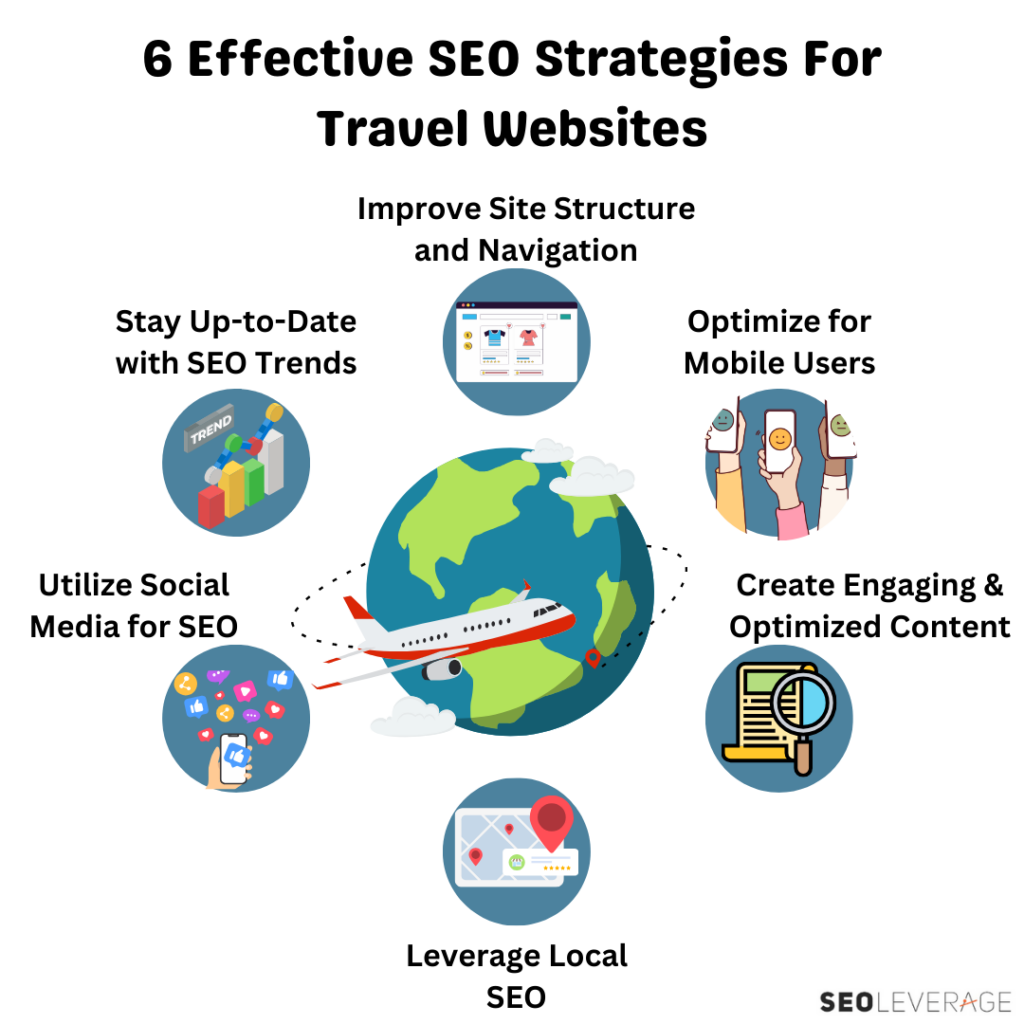SEO for travel websites emerges as a beacon, leading you to the coveted first-page of search engines, paramount in capturing the attention of wanderlust-filled explorers initiating their journey online. With the right travel search engine optimization services, you can surge ahead in organic search results and chart a course for sustainable business growth that outpaces the fleeting allure of PPC advertising.
From the cobbled streets of old European towns to the silken sands of secluded island beaches, every destination has a story. And your website is the gateway, inviting travelers to step into the adventures you curate. But just as intricate details enrich a traveler's experience, fine-tuning elements like local SEO, site speed, and voice search optimization are essential in ensuring your website is discoverable, engaging, and, most importantly, preferred by search engines.
At SEOLeverage, our digital marketing strategy is based on the ERICA SEO Framework. This framework combines industry best practices, data-driven insights, and innovative strategies to help businesses achieve long-term SEO success. As our client, you'll have access to our proprietary SEOLeverage App - a powerful tool that allows you to track your SEO progress, receive personalized recommendations, access training resources, and communicate directly with your dedicated SEO consultant.
Key Takeaways
- Captivate travelers and destinations with engaging content and a seamless user experience to climb search engine rankings.
- Strategically incorporate relevant long-tail keywords travelers use without compromising readability to boost discoverability.
- Build trust and authority by garnering backlinks from reputable travel websites and publications and fostering traveler engagement through fresh content and positive reviews.
Table of Contents
1. Improve Site Structure and Navigation
The significance of a well-structured site cannot be overstated. A coherent website architecture is both the map and compass for your users and search engines alike, ensuring that no page goes unexplored and every experience is within reach.
Here's how you can optimize your site structure and navigation to enhance your travel SEO services:
Organize your content with the purpose
Think of your website's architecture as the foundation of a bustling airport. Each page should be like a clearly marked gate, guiding visitors to their desired destination with ease.
Implement a hierarchy that logically groups topics and subtopics. This hierarchy will enable search engines to understand the structure and content of your site.
Optimize your URLs and meta information
A URL should be a signpost, clear and indicative of the content that awaits. Use keywords effectively to ensure clarity and relevance.
Don't let your meta titles and descriptions be an afterthought. Craft them with precision, as they are the snippets that entice users from the SERPs to your site.
Enhance internal linking
Internal links are the veins through which the lifeblood of your SEO flows. They give context and create a roadmap for both users and search engines, highlighting the interconnectedness of your content.
Engage through additional channels
A blog can be your travel website's journal that resonates with readers and improves SEO through fresh, unique content.
Embrace the power of social networks for promotion, and keep your audience engaged with regular newsletters and RSS feed updates. Consider leveraging tools like Google Adwords for immediate visibility while tracking your progress with Google Analytics - something that our app can be of great help.
If you want to know more Tips to Optimize Your Website here is an article that might interest you.
2. Optimize for Mobile Users
With a staggering number of travelers reaching for their smartphones to plan their next adventure, ensuring your website is mobile-friendly isn't just a recommendation; it's a necessity.
Here's how you can harness the power of mobile optimization to stay ahead:
Responsive design for a seamless experience
Your travel website must fluidly adapt to different screen sizes, ensuring that all elements, including text, images, and forms, are displayed correctly. A mobile-optimized site that reformats itself for mobile devices guarantees a better user experience, keeping potential customers engaged regardless of the device they use.
Speed as a ranking signal
Google's algorithm favors websites that load quickly, especially on mobile. A delay of even a few seconds can be costly.
The mobile-first mentality in SEO
When considering SEO for your travel website, adopt a 'mobile-first' approach. This means prioritizing mobile users from the start, with larger buttons and reduced text, to ensure a friction-free experience. By doing so, you not only cater to the mobile audience but also improve your chances of converting visitors into purchasers.
3. Create Engaging and Optimized Content
Your content is the compass that guides readers to your website. To ensure that this compass points true, a meticulous approach to SEO is critical.
Here's how you can create engaging and optimized:
Keyword cartography
Launch your SEO voyage with thorough keyword research. Identify terms that are not only popular but also have less competition. Doing so increases your chances of getting on top of search engine results pages.
Incorporate these keywords naturally into your content, especially within titles, headings, and URLs, to signal to search engines the relevance of your travel tales.
Optimization arsenal
Utilize tools like Google Analytics to monitor your site's traffic and understand which pages resonate most with your audience. After that, tailor your content to your readers' preferences.
Leverage plugins that provide real-time feedback on your SEO efforts, guiding you to optimize each post for better search engine visibility.
Speed and accessibility
Ensure your page loads at lightning speed, as slow sites not only frustrate users but also hinder SEO. Address issues such as unoptimized images and bulky code that can weigh down your site's performance.
Pay attention to details like adding alt attributes to images and verifying that all links are functional. These small tweaks can significantly improve your site's SEO.
Content mastery
Write high-quality, engaging content that seamlessly integrates relevant keywords without compromising the storytelling aspect of your travel blog.
Build internal links to guide readers through a journey across your site, enhancing their experience and your SEO. Simultaneously, focus on acquiring backlinks from other websites to bolster your site's authority.
Embrace the E-A-T-T principle by showcasing your expertise and establishing trust with your audience, which Google rewards with higher rankings.
Topical authority and user intent
Specialize in a niche to become a recognized authority on specific travel topics, increasing the likelihood of ranking higher on Google.
Analyze the search intent behind your keywords and strategically place them where they have the most impact, such as in meta descriptions and anchor text.
4. Leverage Local SEO
Local SEO stands as a pillar for businesses aiming to garner attention in their specific locales. Here's how you can leverage local SEO to ensure your travel website blends into the background and stands out as a beacon for local and visiting adventurers:
Keyword integration
Begin by sprinkling local keywords across your website's prime real estate—your homepage, landing pages, and particularly in those crucial meta descriptions and tags. This strategic placement helps your site rank higher in local search results.
Google Business Profile optimization
Claim and polish your Google Business Profile. Ensure your listing is complete, with every detail from your address to your opening hours crystal clear and current. This not only aids in ranking but also serves as your digital storefront, inviting in potential customers.
Cultivating reviews
Encourage everyone to leave reviews on platforms like Google. But don't shy away from the less-than-stellar ones—responding to these professionally shows you value feedback and are committed to improvement. This practice not only enhances your credibility but also your visibility.
It is essential to know the importance of local SEO, as it greatly affects your business. It is also useful to know the benefits that local SEO has for your business. Here is an article with Tips to boost visibility.
5. Utilize Social Media for SEO
As you navigate the digital seas of SEO for your travel website, incorporating social media is like setting full sail—maximizing your visibility and propelling your brand forward.
Here's how you can anchor your social media efforts to boost your travel SEO services:
Optimize your social media profiles
- Username: Choose a handle that reflects your brand and is easily searchable.
- Bio: Infuse your bio with relevant keywords and hashtags to make your profile more discoverable to those seeking travel inspiration.
- Posts: Regularly incorporate keywords and trending hashtags into your posts to sail the tides of search algorithms. Remember to edit alt text for images to improve accessibility and SEO.
- Branding: Ensure consistency across all platforms, from your profile picture to your posting style, to strengthen your brand identity.
Leverage content marketing
- Consistency: Maintain a regular posting schedule.
- Share-Worthy: Aim for content that sparks the desire to be shared, increasing your reach and building backlinks naturally.
Enhance local SEO through social media
- Geo-Tagging: Tag your location in posts to attract local audiences and travelers currently exploring your area.
- Local Collaborations: Partner with local businesses and influencers to expand your reach within the community and build local backlinks.
- Encourage Interaction: Prompt customers to check in and leave reviews on social platforms, boosting your local SEO presence.
6. Stay Up-to-Date with SEO Trends
Staying abreast of SEO trends is imperative for your travel website's survival and success.
Here's how you can pivot and adapt to the evolving SEO landscape:
- Implement schema markup, as this helps search engines display your travel offerings more prominently, making it easier for local explorers to find what they're looking for.
- Utilize AR, virtual tours, and advanced booking systems to offer an immersive experience that sets you apart in the travel market.
- Highlight your expertise and credibility through well-researched and engaging content, such as local guides and travel tips, to build trust with your audience.
- Optimize your content for voice search.
- Produce zero-click friendly content that answers travelers' queries directly on the SERP, increasing your chances of capturing organic traffic.
You can use our SEOLeverage app to analyze the potential impact of Google updates on your website's performance.

Get Started with SEO Services Today
Ready to boost your digital presence, attract more targeted traffic, and drive meaningful results? It's time to consider SEO services. SEOLeverage's comprehensive SEO solutions, combined with the power of the SEOLeverage App, can help your travel websites thrive in the competitive digital changing atmosphere.
Before implementing any SEO strategies, we will conduct a thorough SEO audit. This crucial step provides valuable insights into your site's current performance and helps create a roadmap for optimization.
Contact SEOLeverage today to book a consultation and start your journey towards SEO success. Together, we'll develop a customized SEO strategy that delivers tangible results.

